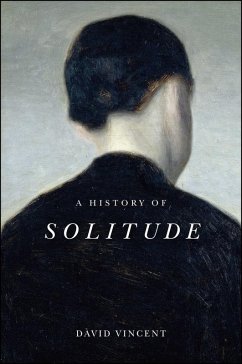Solitude has always had an ambivalent status: the capacity to enjoy being alone can make sociability bearable, but those predisposed to solitude are often viewed with suspicion or pity.
Drawing on a wide array of literary and historical sources, David Vincent explores how people have conducted themselves in the absence of company over the last three centuries. He argues that the ambivalent nature of solitude became a prominent concern in the modern era. For intellectuals in the romantic age, solitude gave respite to citizens living in ever more complex modern societies. But while the search for solitude was seen as a symptom of modern life, it was also viewed as a dangerous pathology: a perceived renunciation of the world, which could lead to psychological disorder and anti-social behaviour.
Vincent explores the successive attempts of religious authorities and political institutions to manage solitude, taking readers from the monastery to the prisoner's cell, and explains how western society's increasing secularism, urbanization and prosperity led to the development of new solitary pastimes at the same time as it made traditional forms of solitary communion, with God and with a pristine nature, impossible. At the dawn of the digital age, solitude has taken on new meanings, as physical isolation and intense sociability have become possible as never before. With the advent of a so-called loneliness epidemic, a proper historical understanding of the natural human desire to disengage from the world is more important than ever. The first full-length account of its subject, A History of Solitude will appeal to a wide general readership.
Drawing on a wide array of literary and historical sources, David Vincent explores how people have conducted themselves in the absence of company over the last three centuries. He argues that the ambivalent nature of solitude became a prominent concern in the modern era. For intellectuals in the romantic age, solitude gave respite to citizens living in ever more complex modern societies. But while the search for solitude was seen as a symptom of modern life, it was also viewed as a dangerous pathology: a perceived renunciation of the world, which could lead to psychological disorder and anti-social behaviour.
Vincent explores the successive attempts of religious authorities and political institutions to manage solitude, taking readers from the monastery to the prisoner's cell, and explains how western society's increasing secularism, urbanization and prosperity led to the development of new solitary pastimes at the same time as it made traditional forms of solitary communion, with God and with a pristine nature, impossible. At the dawn of the digital age, solitude has taken on new meanings, as physical isolation and intense sociability have become possible as never before. With the advent of a so-called loneliness epidemic, a proper historical understanding of the natural human desire to disengage from the world is more important than ever. The first full-length account of its subject, A History of Solitude will appeal to a wide general readership.
Dieser Download kann aus rechtlichen Gründen nur mit Rechnungsadresse in D ausgeliefert werden.
"Superb ... a remarkably versatile study."
Terry Eagleton, The Guardian
"[A] beautifully written, nuanced and now topical history."
The Spectator
"Totally absorbing."
Sydney Morning Herald
"[B]ursts with fascinating information and chewy ideas."
The Telegraph
"[An] elegantly written and acute history ... It is characteristic of Vincent's insight that he detects mirrors everywhere."
Yorkshire Times
"In this well-judged history of a currently pressing preoccupation ... Vincent performs a useful public service: he recognises the uniqueness of our contemporary problems, but gives them the calming and edifying perspective of context."
Times Higher Education
"Are we living in a lonely age and, if so, when did it begin? In this riveting history, David Vincent tackles this timely question by bringing to light everyday experiences of solitude and loneliness from the late eighteenth century to the present. Here we meet solitary walkers, spiritual recluses, sailors on long solo voyages, but also men and women locked up in asylums or prisons where unremitting isolation broke minds and spirits. Solitude could be nourishing but it could also madden or even kill. Vincent gives us the stories in rich detail, in a pathbreaking book that will fascinate anyone interested in solitariness, past or present."
Barbara Taylor, Queen Mary University of London
"This is a superb book. David Vincent has mobilized texts that he has mastered over fifty years of scholarship and supplemented these - poetry, novels, memoirs, and autobiography - with a dazzling range of sources on everything from stamp-collecting to dog-walking to prison reform. He manages the intractable distinction between solitude and loneliness over a large domain. This will become the standard work on a topic of both academic and general interest."
Thomas Laqueur, University of California at Berkeley
"This is a deeply researched book that sheds light on many aspects of modern history, from leisure to penology. While exploring rich historical cases, the book also provides an explicit backdrop for contemporary concerns about loneliness but also about modern barriers to achieving solitude. A real gem."
Peter Stearns, George Mason University
"Original, bang up-to-date, and impressive in its scholarship. This is a fine piece of work from an experienced historian."
Colin Heywood, University of Nottingham
"Vincent's new book, [....] examines how our attitudes to being alone - physically and mentally - have changed over time. The breadth of his study is impressive. Vincent is refreshingly sceptical about the UK's supposed 'loneliness epidemic'."
David Robson, The Independent
Terry Eagleton, The Guardian
"[A] beautifully written, nuanced and now topical history."
The Spectator
"Totally absorbing."
Sydney Morning Herald
"[B]ursts with fascinating information and chewy ideas."
The Telegraph
"[An] elegantly written and acute history ... It is characteristic of Vincent's insight that he detects mirrors everywhere."
Yorkshire Times
"In this well-judged history of a currently pressing preoccupation ... Vincent performs a useful public service: he recognises the uniqueness of our contemporary problems, but gives them the calming and edifying perspective of context."
Times Higher Education
"Are we living in a lonely age and, if so, when did it begin? In this riveting history, David Vincent tackles this timely question by bringing to light everyday experiences of solitude and loneliness from the late eighteenth century to the present. Here we meet solitary walkers, spiritual recluses, sailors on long solo voyages, but also men and women locked up in asylums or prisons where unremitting isolation broke minds and spirits. Solitude could be nourishing but it could also madden or even kill. Vincent gives us the stories in rich detail, in a pathbreaking book that will fascinate anyone interested in solitariness, past or present."
Barbara Taylor, Queen Mary University of London
"This is a superb book. David Vincent has mobilized texts that he has mastered over fifty years of scholarship and supplemented these - poetry, novels, memoirs, and autobiography - with a dazzling range of sources on everything from stamp-collecting to dog-walking to prison reform. He manages the intractable distinction between solitude and loneliness over a large domain. This will become the standard work on a topic of both academic and general interest."
Thomas Laqueur, University of California at Berkeley
"This is a deeply researched book that sheds light on many aspects of modern history, from leisure to penology. While exploring rich historical cases, the book also provides an explicit backdrop for contemporary concerns about loneliness but also about modern barriers to achieving solitude. A real gem."
Peter Stearns, George Mason University
"Original, bang up-to-date, and impressive in its scholarship. This is a fine piece of work from an experienced historian."
Colin Heywood, University of Nottingham
"Vincent's new book, [....] examines how our attitudes to being alone - physically and mentally - have changed over time. The breadth of his study is impressive. Vincent is refreshingly sceptical about the UK's supposed 'loneliness epidemic'."
David Robson, The Independent









